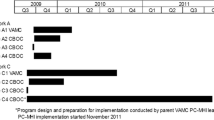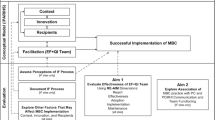ABSTRACT
BACKGROUND
Implementing new programs and practices is challenging, even when they are mandated. Implementation Facilitation (IF) strategies that focus on partnering with sites show promise for addressing these challenges.
OBJECTIVE
Our aim was to evaluate the effectiveness of an external/internal IF strategy within the context of a Department of Veterans Affairs (VA) mandate of Primary Care–Mental Health Integration (PC-MHI).
DESIGN
This was a quasi-experimental, Hybrid Type III study. Generalized estimating equations assessed differences across sites.
PARTICIPANTS
Patients and providers at seven VA primary care clinics receiving the IF intervention and national support and seven matched comparison clinics receiving national support only participated in the study.
INTERVENTION
We used a highly partnered IF strategy incorporating evidence-based implementation interventions.
MAIN MEASURES
We evaluated the IF strategy using VA administrative data and RE-AIM framework measures for two 6-month periods.
KEY RESULTS
Evaluation of RE-AIM measures from the first 6-month period indicated that PC patients at IF clinics had nine times the odds (OR=8.93, p<0.001) of also being seen in PC-MHI (Reach) compared to patients at non-IF clinics. PC providers at IF clinics had seven times the odds (OR=7.12, p=0.029) of referring patients to PC-MHI (Adoption) than providers at non-IF clinics, and a greater proportion of providers’ patients at IF clinics were referred to PC-MHI (Adoption) compared to non-IF clinics (β=0.027, p<0.001). Compared to PC patients at non-IF sites, patients at IF clinics did not have lower odds (OR=1.34, p=0.232) of being referred for first-time mental health specialty clinic visits (Effectiveness), or higher odds (OR=1.90, p=0.350) of receiving same-day access (Implementation). Assessment of program sustainability (Maintenance) was conducted by repeating this analysis for a second 6-month time period. Maintenance analyses results were similar to the earlier period.
CONCLUSION
The addition of a highly partnered IF strategy to national level support resulted in greater Reach and Adoption of the mandated PC-MHI initiative, thereby increasing patient access to VA mental health care.



Similar content being viewed by others
REFERENCES
National Research Council. Improving the quality of health care for mental and substance-use conditions: Quality Chasm Series. Washington, DC: The National Academies Press; 2006.
Grol R, Wensing M, Eccles M. Improving Patient Care: The Implementation of Change in Clinical Practice. London: Elsevier; 2005.
Wensing M, Fluit C, Grol R. Educational Strategies. In: Grol R, Wensing M, Eccles M, Davis D, eds. Improving Patient Care: The Implementation of Change in Clinical Practice. 2nd ed. West Sussex, UK: John Wiley and Sons, Ltd.; 2013:197–209.
Greenhalgh T, Robert G, MacFarlane F, Bate P, Kyriakidou O. Diffusion of innovations in service organizations: Systematic review and recommendations. Milbank Q. 2004;82:581–629.
Ferlie EB, Shortell SM. Improving the quality of health care in the United Kingdom and the United States: A framework for change. Milbank Q. 2001;79:281–315.
Parker LE, Kirchner JE, Bonner LM, et al. Creating a quality improvement dialogue: Utilizing knowledge from frontline staff, managers, and experts to foster health care quality improvement. Qual Health Res. 2009;19:229–42.
Parker LE, De Pillis E, Altschuler A, Rubenstein LV, Meredith LS. Balancing participation and expertise: A comparison of locally and centrally managed health care quality improvement within primary care practices. Qual Health Res. 2007;17:1268–79.
Stetler CB, Legro MW, Rycroft-Malone J et al. Role of external facilitation in implementation of research findings: A qualitative evaluation of facilitation experiences in the Veterans Health Administration. Implement Sci. 2006;1.
Taylor EF, Machta RM, Meyers DS, Genevro J, Peikes DN. Enhancing the primary care team to provide redesigned care: The roles of practice facilitators and care managers. Ann Fam Med. 2013;11:80–3.
Dogherty E, Harrison M, Baker C, Graham I. Following a natural experiment of guideline adaptation and early implementation: A mixed-methods study of facilitation. Implement Sci. 2012;7:9.
Rycroft-Malone J, Harvey G, Seers K, Kitson A, McCormack B, Titchen A. An exploration of the factors that influence the implementation of evidence into practice. J Clin Nurs. 2004;13:913–24.
Harvey G, Loftus-Hills A, Rycroft-Malone J, et al. Getting evidence into practice: The role and function of facilitation. J Adv Nurs. 2002;37:577–88.
Hayden P, Frederick L, Smith BJ, Broudy A. Developmental Facilitation: Helping Teams Promote Systems Change. Collaborative Planning Project for Planning Comprehensive Early Childhood Systems. 2–21. 2001. Center for Collaborative Educational Leadership, Denver CO 80204.
Heron J. Dimensions of facilitator style. Guildford: University of Surrey; 1977.
Thompson GN, Estabrooks C, Degner LF. Clarifying the concepts in knowledge transfer: A literature review. J Adv Nurs. 2006;53:691–701.
Wiltsey Stirman S, Kimberly J, Cook N, Calloway A, Castro F, Charns M. The sustainability of new programs and innovations: A review of the empirical literature and recommendations for future research. Implement Sci. 2012;7:17.
Kirchner JE, Parker LE, Bonner LM, Fickel JJ, Yano E, Ritchie MJ. Roles of managers, frontline staff and local champions, in implementing quality improvement: Stakeholders' perspectives. J Eval Clin Pract. 2012;18:63–9.
Fortney JC, Pyne JM, Smith JL, et al. Steps for implementing collaborative care programs for depression. Popul Health Manag. 2009;12:69–79.
Kirchner J, Edlund CN, Henderson K, Daily L, Parker LE, Fortney JC. Using a multi-level approach to implement a primary care mental health (PCMH) program. Fam Syst Health. 2010;28:161–74.
Veterans Health Administration. Uniform Mental Health Services in VA Medical Centers and Clinics, VHA Handbook 1600.01. 6-11-2008. Washington, D.C., Department of Veterans Affairs.
Post EP, Metzger M, Dumas P, Lehmann L. Integrating mental health into primary care within the Veterans Health Administration. Fam Syst Health. 2010;28:83–90.
Curran GM, Bauer M, Mittman B, Pyne JM, Stetler C. Effectiveness-implementation hybrid designs: Combining elements of clinical effectiveness and implementation research to enhance public health impact. Med Care. 2012;50:217–26.
Charns MP. Organization design of integrated delivery systems. Hosp Health Serv Adm. 1997;42:411–32.
Kirchner JE, Ritchie MJ, Dollar KM, Gundlach P, Smith JL. Implementation Facilitation Training Manual: Using External and Internal Facilitation to Improve Care in the Veterans Health Administration. http://www.queri.research.va.gov/tools/implementation/Facilitation-Manual.pdf 2013. Accessed August 25, 2014.
Glasgow RE, McKay HG, Piette JD, Reynolds KD. The RE-AIM framework for evaluating interventions: What can it tell us about approaches to chronic illness management? Patient Educ Couns. 2001;44:119–27.
Glasgow RE. Translating research to practice. Lessons learned, areas for improvement, and future directions. Diabetes Care. 2003;26:2451–6.
Pfeiffer PN, Szymanski BR, Zivin K, Post EP, Valenstein M, McCarthy JF. Are primary care mental health services associated with differences in specialty mental health clinic use? Psychiatr Serv. 2011;62:422–5.
Wray LO, Szymanski BR, Kearney LK, McCarthy JF. Implementation of primary care-mental health integration services in the Veterans Health Administration: program activity and associations with engagement in specialty mental health services. J Clin Psychol Med Settings. 2012;19:105–16.
Zivin K, Pfeiffer PN, Szymanski BR, et al. Initiation of Primary Care-Mental Health Integration programs in the VA Health System: associations with psychiatric diagnoses in primary care. Med Care. 2010;48:843–51.
Unutzer J, Katon W, Callahan CM, et al. Collaborative care management of late-life depression in the primary care setting: A randomized controlled trial. JAMA. 2002;288:2836–45.
Krahn DD, Bartels SJ, Coakley E, et al. PRISM-E: Comparison of integrated care and enhanced specialty referral models in depression outcomes. Psychiatr Serv. 2006;57:946–53.
Zanjani F, Miller B, Turiano N, Ross J, Oslin D. Effectiveness of telephone-based referral-care management, a brief intervention designed to improve psychiatric treatment engagement. Psychiatr Serv. 2008;59:776–81.
Atkins D. QUERI: Connecting Research and Patient Care. HSR&D Field Based Meeting; 10 Jul; 2010.
Ritchie MJ, Dollar KM, Kearney LK, Kirchner JE. Research and Services Partnerships: Responding to needs of clinical operations partners: Transferring implementation facilitation knowledge and skills. Psychiatr Serv. 2014;65(2):141–3.
Kirchner JE, Kearney LK, Ritchie MJ, Dollar KM, Swensen AB, Schohn M. Research & Services Partnerships: Lessons learned through a national partnership between clinical leaders and researchers. Psychiatr Serv. 2014;65(5):577–9.
Acknowledgements
The authors thank Carrie Edlund, MS for assistance with editing and manuscript preparation.
This material is based on work supported by the U.S. Department of Veterans Affairs (VA) Health Services Research and Development (HSR&D) Service and the VA Quality Enhancement Research Initiative (QUERI) (grant SDP 08–316).
Disclaimer
The views expressed in this article are those of the authors and do not necessarily reflect the position or policy of the Department of Veterans Affairs.
Conflicts of Interest
The authors declare that they do not have a conflict of interest.
Author information
Authors and Affiliations
Corresponding author
Electronic supplementary material
Below is the link to the electronic supplementary material.
ESM 1
(DOCX 25 kb)
Rights and permissions
About this article
Cite this article
Kirchner, J.E., Ritchie, M.J., Pitcock, J.A. et al. Outcomes of a Partnered Facilitation Strategy to Implement Primary Care–Mental Health. J GEN INTERN MED 29 (Suppl 4), 904–912 (2014). https://doi.org/10.1007/s11606-014-3027-2
Published:
Issue Date:
DOI: https://doi.org/10.1007/s11606-014-3027-2




